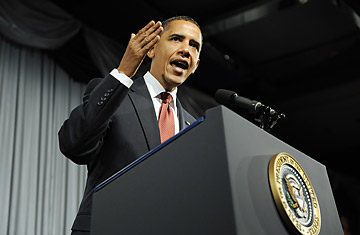
President Obama speaks about the health-care system at the annual meeting of the American Medical Association in Chicago
(2 of 2)
As Senate leaders prepare to unveil specific health-care proposals in the next week, it's clear that a public plan could mean many things. But given the levels of Republican and even some moderate Democratic opposition — and the sizable wiggle room the Administration has left itself in order to compromise down the line — it seems very unlikely that it would end up being a liberal approach: a system heavily subsidized by the Federal Government that pays medical providers the same rates they are currently reimbursed by Medicare. Such a proposal would be a battle cry for doctors and hospitals, which are already reeling from low Medicare rates that have not kept pace with inflation, and the private insurance industry, which argues that it could never compete on such an uneven playing field.
A more tenable option, at least politically, might be a public plan that operates much like private insurance companies. This kind of plan could be self-sustaining, funded by premiums, and available to consumers via a so-called insurance exchange, a clearinghouse through which Americans could choose from a selection of health-insurance options.
The question remains, however, whether a public insurance plan that operates like a private insurance company could actually do what it's supposed to: lower the cost for consumers. But many health-policy analysts believe that even such a plan — whether it's one national provider or it's broken into regional systems — could create a large enough pool (or pools) of patients to be able to offer lower premiums than those now offered to individuals and small businesses. In addition, a public insurance plan would not have to cover overhead for marketing or profit margins, part of the reason it would have substantially lower administrative costs. (By some estimates, Medicare's administrative costs account for less than 5% of total costs, compared with up to 20% for private insurers.)
Still, in order to shake up the system, a public plan would need to have enough doctors and hospitals participating as part of its network. Many Democrats believe that would only happen if providers were forced to accept patients, most likely as a condition of participating in Medicare — an idea that the AMA and others reject out of hand. Yet, as Blumberg points out, for all the conservative scare stories about government health care, "the people with the most choice are the people who are in the traditional Medicare program ... [with access to] a huge network of providers because of market power."
Another way a public plan could drive down costs is by forcing private insurers to be more transparent. "The public plan will teach the country what this stuff actually costs," says Len Nichols, director of the New America Foundation's Health Policy Program and co-author of a March 2009 proposal for a public-plan option. Nichols says a public plan could provide a "credible benchmark" that consumers could use to measure whether private insurers are offering fair rates.
For the moment, even public plan options that don't potentially undercut private insurers lack traction with Senate Republicans, which is why Democratic Senator Kent Conrad over the weekend proposed the creation of "consumer health cooperatives." The idea, in essence, is to create a public option that isn't technically public at all; according to a one-page Conrad proposal circulating this week, state or regional nonprofit cooperatives would be created by federal charter and be member-owned and operated by boards of directors. The co-ops would operate by the rules of the insurance exchange and be capitalized by initial federal seed money. Conrad has compared the model to an HMO-like health cooperative operating in Washington State, but also, oddly enough, to agricultural cooperatives like Ocean Spray and Land O'Lakes. Republicans have not outright rejected the co-op idea. And over the weekend, Health and Human Services Secretary Kathleen Sebelius said of the co-op plan, "Having these ideas on the table is exactly where we need to be right now." The question is, Will any one of them be enough to get health-care reform to the President's desk by the end of the year?
